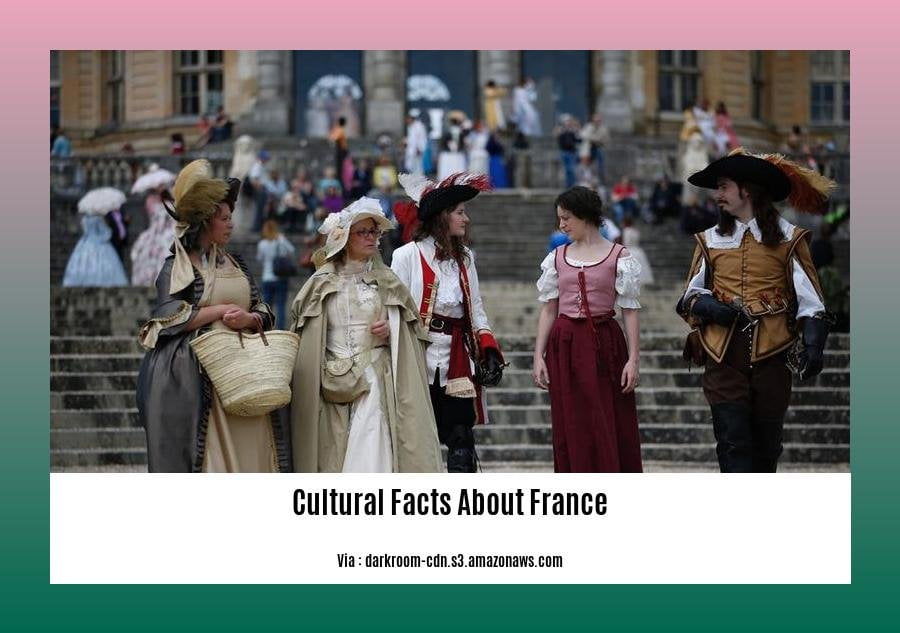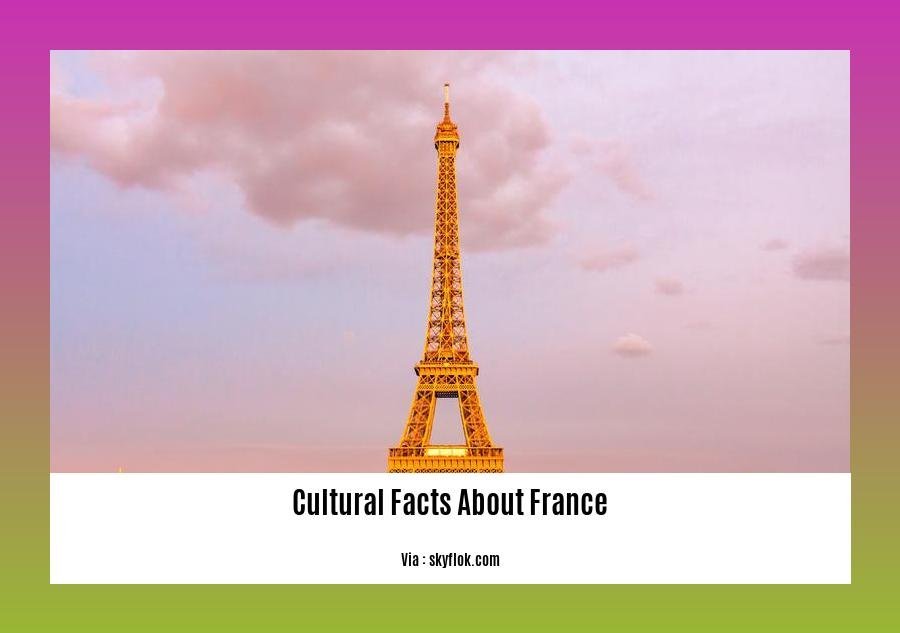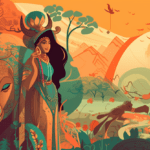Embark on a captivating journey through the vibrant cultural tapestry of France in our article, “Unveiling the Cultural Tapestry of France: A Journey Through History, Art, and Traditions.” Discover the country’s rich heritage, from its captivating history and artistic masterpieces to its cherished traditions and diverse culinary delights. Prepare to be enchanted as we unravel the unique threads that weave together the fabric of French culture, offering a glimpse into the heart and soul of this extraordinary nation.
Key Takeaways:
- France is renowned as the birthplace of cinema.
- French is an official language in 29 countries worldwide.
- French is the second most learned foreign language globally.
- The French are known for their polite and courteous behavior.
- Striking is a deeply rooted part of French culture, used to express discontent or demand change.
- France is considered the culinary capital of the world, with diverse regional cuisines.
- Bread holds cultural importance and is consumed at every meal in France.
- France is among the oldest nations on Earth, boasting a rich history and heritage.
- France is the most ethnically diverse country in Europe, reflecting its colonial past and immigration patterns.
- The French are known for their strong sense of patriotism, evident in various aspects of their culture and society.
- French families tend to be smaller, with an average of one to two children.
- The French place a high value on fashion and style, with a strong cultural appreciation for dressing well.
Cultural facts about France

France, with its rich and diverse cultural history, offers a fascinating tapestry of customs, traditions, and expressions that have shaped its unique identity. Let’s explore some intriguing cultural facts about this captivating nation:
1. The French Language: A Global Resonance
French is spoken in 29 countries worldwide, making it a widely communicated language across continents.
It ranks as the second most learned foreign language globally, a testament to its cultural significance and global reach.
2. French Etiquette: A Symphony of Courtesy
The French uphold a strong sense of etiquette, renowned for their polite and courteous behavior in social interactions.
Greetings, such as “Bonjour” and “Bonsoir,” are essential, showing respect and acknowledging others’ presence.
3. Striking: A Cultural Expression of Dissent
Striking, or industrial action, is deeply ingrained in French culture, serving as a means to express discontent and demand change.
It’s a significant part of French labor relations, reflecting the nation’s commitment to workers’ rights and social justice.
4. Gastronomic Delights: A Culinary Paradise
France holds the title of the culinary capital of the world, with its diverse regional cuisines and world-renowned chefs.
The French take immense pride in their food, elevating dining to an art form and savoring every meal as a cultural experience.
5. French Fashion: A Timeless Elegance
The French are known for their impeccable sense of style, emphasizing fashion and dressing well as an integral part of their culture.
From haute couture to everyday chic, French fashion exudes an air of elegance and sophistication that has influenced global trends.
6. Strong Patriotism: A Deep Love for France
The French are deeply patriotic, expressing their love for their country through various cultural manifestations.
The national anthem, “La Marseillaise,” is a symbol of unity and pride, evoking emotions and a sense of belonging among the French.
7. Smaller Families: Reflecting Societal Shifts
French families tend to be smaller, with an average of one to two children, mirroring societal and economic factors.
This shift reflects the changing family dynamics in France, influenced by factors such as urbanization, education, and career aspirations.
8. Cinema’s Birthplace: A Legacy of Moving Images
France is the birthplace of cinema, holding a pivotal role in the development of this influential art form.
The Lumière brothers, pioneers in cinematography, introduced the world to the magic of moving pictures, forever changing the entertainment landscape.
- Do you know that Greece is the oldest democracy in the world? Discover more intriguing facts about Greece. 10 facts about Greece!
- Germany has a rich history and unique culture. Want to know more about German culture? Then explore facts about Germany culture here!
- Ever wondered about the history of Rome? Get your hands on some fascinating facts about Italian Rome here!
Cultural significance of French fashion and design
In the world of fashion and design, France stands as a beacon of elegance, luxury, and artistic expression. Its influence on global trends is undeniable, with iconic fashion houses like Chanel, Dior, and Yves Saint Laurent leaving an indelible mark on the industry. But what truly sets French fashion apart is its deep cultural significance, a reflection of the country’s rich history, artistic heritage, and unique way of life.
A Legacy of Luxury and Artisanship
For over three centuries, France has been synonymous with luxury fashion. In the 17th century, the court of Louis XIV fostered a thriving industry of artisans and craftsmen, who created exquisite garments for the nobility. This tradition of excellence continued into the 19th century, with the rise of haute couture, where designers like Charles Worth revolutionized fashion by creating one-of-a-kind pieces tailored to the individual.
Cultural Expressions of French Fashion
French fashion is more than just about luxury and craftsmanship; it is a cultural expression of French identity and values. The iconic beret, for example, was originally worn by the working class but has since become a symbol of French chic. Similarly, the striped Breton shirt, once associated with fishermen, is now a staple in any fashion-forward wardrobe.
Fashion as Art
In France, fashion is elevated to the level of art. Designers are seen as artists, and their creations are often displayed in museums and galleries. This blurring of the lines between fashion and art is a testament to the cultural significance of fashion in France.
Key Takeaways:
- French fashion holds a 300-year legacy of luxury and artisanship, shaping global trends since the 17th century.
- French haute couture, established in the 19th century, revolutionized fashion with its focus on bespoke, one-of-a-kind garments.
- Fashion in France is deeply intertwined with cultural identity, with iconic items like the beret and Breton shirt symbolizing French chic.
- French fashion is regarded as an art form, with designers celebrated as artists and their creations showcased in museums and galleries.
Citations:
- France – Ministère de la Culture: La mode en France
- French fashion – Wikipedia:
Celebrating French Arts, Literature, and Cinema

Immerse yourself in a captivating journey through the rich tapestry of French arts, literature, and cinema. France has long been a cultural powerhouse, boasting an unparalleled heritage that continues to captivate and inspire generations. From the iconic works of art that adorn museums to the masterful storytelling that graces bookshelves, France has left an indelible mark on the global cultural landscape. Let’s embark on an enchanting exploration of this nation’s artistic expressions.
The Canvas of French Art
French art is a symphony of styles and movements that have redefined the art world. The country is home to iconic masterpieces like the Mona Lisa and The Starry Night, testaments to the enduring impact of French artists. From the delicate brushstrokes of Impressionism to the bold colors of Fauvism, French art has pushed boundaries and revolutionized the way we perceive the world.
Impressionism: Born in the late 19th century, Impressionism captured the fleeting moments of light and color, transforming everyday scenes into extraordinary impressions. Artists like Monet, Renoir, and Degas immortalized the beauty of the French countryside and Parisian life, forever changing the course of art history.
Fauvism: A movement that challenged traditional notions of color and form, Fauvism emerged in the early 20th century. Led by Henri Matisse and André Derain, Fauvist paintings exploded with vibrant, non-naturalistic colors, expressing raw emotions and subjective experiences.
The Enchanting World of French Literature
French literature is a treasure trove of stories, philosophies, and ideas that have shaped the literary landscape for centuries. From the timeless tales of Victor Hugo to the existential musings of Albert Camus, French authors have delved into the depths of the human condition, offering profound insights into life, love, and society.
Victor Hugo: A giant of French literature, Hugo’s works, such as “Les Misérables” and “The Hunchback of Notre-Dame,” are epic sagas that explore themes of social justice, redemption, and the human spirit.
Albert Camus: His existentialist writings, epitomized by “The Stranger” and “The Plague,” delve into the complexities of human existence, questioning the meaning of life in an indifferent universe.
The Silver Screen Magic of French Cinema
France is considered the birthplace of cinema, and its film industry continues to produce critically acclaimed masterpieces. French cinema has captivated audiences worldwide with its unique storytelling, iconic directors, and unforgettable performances.
The New Wave (Nouvelle Vague): In the 1950s and ’60s, the French New Wave movement revolutionized filmmaking with its innovative techniques, handheld camerawork, and exploration of social and philosophical themes. Directors like Jean-Luc Godard and François Truffaut redefined the art of cinema.
Recent Acclaimed Films: Contemporary French cinema continues to shine with films like “The Artist,” “Amour,” and “Parasite,” which have garnered global recognition and awards for their artistic excellence and poignant storytelling.
Key Takeaways:
Art Appreciation: French art, with its diverse movements and iconic masterpieces, has had a profound impact on the global art world, inspiring and influencing artists and movements across the globe.
Literary Luminaries: French literature boasts a rich tradition of storytelling, producing renowned authors who have explored profound themes, captivating readers with their unique perspectives and insights.
Cinematic Excellence: France’s film industry, known for its groundbreaking movements and acclaimed directors, has shaped the history of cinema, producing critically acclaimed films that continue to captivate audiences worldwide.
Sources:
French Art – Encyclopedia Britannica
French Literature – Encyclopedia Britannica
Impactful French traditions and festivals
France, a country steeped in history and tradition, boasts an array of festivals that encapsulate the essence of its vibrant culture. Here’s a glimpse into some of the most impactful French traditions and festivals:
Bastille Day: A Celebration of Liberty
Bastille Day, known as “La Fête Nationale,” is France’s national holiday, celebrated annually on July 14 to mark the storming of the Bastille prison in 1789. This symbolic event symbolized the beginning of the French Revolution and is commemorated with grand military parades, fireworks displays, and street festivities nationwide. The Champs-Élysées in Paris becomes a sea of revelers draped in the tricolor flag, embodying the spirit of liberty, equality, and fraternity that defines France.
Carnaval de Nice: A Spectacle of Color and Creativity
The Carnaval de Nice, held annually on the French Riviera, is a spectacular celebration known for its vibrant parades, intricate floats, and dazzling costumes. This two-week-long festival draws millions of visitors who revel in the infectious energy of street performers, musicians, and dancers. The highlight of the carnival is the spectacular “Bataille des Fleurs,” where flower-covered floats shower spectators with a fragrant burst of petals.
Tour de France: A Testament to Athleticism and Endurance
The Tour de France, the world’s most prestigious cycling race, is a grueling three-week event that showcases the beauty of the French countryside and the extraordinary resilience of its cyclists. This iconic race, held annually since 1903, attracts millions of spectators who line the roadsides to cheer on the riders as they conquer legendary mountain passes and pedal through picturesque vineyards and villages.
Fête de la Musique: A Symphony of Sounds
The Fête de la Musique, or World Music Day, is a unique celebration held on June 21 each year. On this day, music fills the streets, parks, and squares of France, as professional musicians and amateurs alike take to the stage to share their talents with the public. From classical concerts to rock performances and impromptu jam sessions, this festival is a testament to France’s love of music and its vibrant arts scene.
Cannes Film Festival: A Celebration of Cinema
The Cannes Film Festival, held annually on the glamorous French Riviera, is one of the most prestigious film festivals in the world. This two-week-long event attracts A-list celebrities, filmmakers, and film enthusiasts from around the globe. The festival showcases a diverse range of films, from independent productions to big-budget blockbusters, and culminates in the highly anticipated awards ceremony, where the coveted Palme d’Or is bestowed upon the best film.
Key Takeaways:
- Bastille Day, celebrated on July 14, commemorates the storming of the Bastille prison during the French Revolution.
- The Carnaval de Nice is a two-week-long festival in Nice known for its colorful parades, intricate floats, and the flower-filled “Bataille des Fleurs.”
- The Tour de France is an iconic cycling race that showcases the beauty of the French countryside.
- The Fête de la Musique is a celebration of music and showcases various performances across France on June 21.
- The Cannes Film Festival, held on the French Riviera, is one of the most prestigious film festivals in the world.
Sources:
– https://www.french.org/culture/34-interesting-facts-about-france-and-french-traditions
– https://www.jadorelyon.com/festivals-in-france
FAQ
Q1: What is the significance of France in the history of cinema?
A1: France holds the distinction of being the birthplace of cinema, with the invention of the cinematograph by the Lumière brothers in 1895. This pioneering achievement laid the foundation for the development of modern filmmaking, solidifying France’s position as a pioneer in the world of cinema.
Q2: Why is learning French important on a global scale?
A2: French is the second most commonly learned foreign language globally, after English, due to its cultural significance and widespread use. With French being the official language in 29 countries, learning it opens up opportunities for communication and cultural exchange on a global scale.
Q3: How does the French language reflect French culture and values?
A3: The French language is renowned for its eloquence and precision, reflecting the French emphasis on politeness and etiquette. The use of formal and informal language, as well as the subtle nuances of pronunciation and grammar, contribute to the richness and complexity of the French language, mirroring the cultural values of politeness and respect.
Q4: What role does fashion play in French culture?
A4: Fashion holds a significant place in French culture, with a long tradition of luxury and artisanship. Paris, the fashion capital of the world, is home to renowned fashion houses and designers who have shaped the global fashion landscape. The French emphasis on style and elegance is evident in their appreciation for well-tailored clothing and accessories.
Q5: How has French cuisine influenced global gastronomy?
A5: French cuisine is celebrated worldwide for its diversity, innovation, and use of fresh, seasonal ingredients. French chefs are renowned for their culinary expertise and have played a pivotal role in shaping the world’s culinary landscape. Dishes like croissants, baguettes, and cheese have become iconic symbols of French cuisine, enjoyed and appreciated by people worldwide.


![Of Silver Screens and Time: A Historical Timeline of Cinema's Evolution [history of cinema timeline] history-of-cinema-timeline_2](https://www.lolaapp.com/wp-content/uploads/2023/12/history-of-cinema-timeline_2-150x150.jpg)












